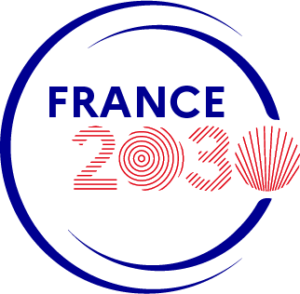Research programs

The Investissements d'Avenir program is worth 35 billion euros, including 22 billion euros earmarked for higher education and research to boost France's competitiveness on the world stage. Of these 22 billion euros, almost 18 billion take the form of competitive calls for projects. The University of Montpellier is heavily involved in this program, through numerous projects in which it is a sponsor or partner.
EquipEx
The University of Montpellier is involved in 7 EquipEx projects, 1 of which (EXTRA) is led by the establishment.
EXcellence CenTer on Antimonides (EXTRA)
Endowment: 4.2 million euros
Objective: to create a reference research center for infrared photonics, considered a key technology for future applications in the fields of communications (multimedia), energy (solar cells), imaging (for health, security, defense, etc.) and sensors.
Project benefits: EXTRA will enable the development of new optoelectronic components (light emitters and detectors) operating in the infrared for these fields of application.
UM partners: IES, CTM
GEOSUD
Allocation: 11.5 million euros
Objective: The GEOSUD project involves the acquisition and provision of satellite coverage of the whole of France, with a particular focus on urban areas. The project also includes the provision of scientific computing capacity to process this information.
Project benefits: The project will provide high-definition images of France and analysis software that can be used for land management, environmental monitoring, natural risk prevention (floods, fires), etc.
UM partners: LIRMM, MESO@LR, OSU-OREME,
ROBOTEX
Endowment: 10.5 million euros
Objective: The ROBOTEX project aims to create a national network of 15 robotics laboratories.
The contributions of the project: Three major areas of robotics have concrete impacts:
- humanoid robotics, which will provide support for people with reduced autonomy;
- medical robotics ;
- micros and nanorobotics, which will lead to considerable advances in the field of healthcare
UM partners: LIRMM
French seismological and geodetic network (RESIF-CORE)
Endowment: 9.3 million euros
Objective: RESIF-CORE will provide France with a new instrumentation system for observing slow terrestrial deformations by setting up a network of sensors.
Project benefits: RESIF-CORE will provide a better understanding of the seismic hazard, and consequently of the associated risks for people and property, in mainland France.
UM partners: Géosciences Montpellier, OREME
Gravitational antenna based on atomic interferometry (MIGA)
Endowment: 9 million euros
Objective: MIGA is an interferometer for observing the Earth's gravitational field. It consists of the construction of a new infrastructure to study the deformations of space-time and gravitation.
Project benefits: the research results will be applied to environmental monitoring to improve prediction of seismic hazards, anticipation of their consequences and the measures to be taken to save lives or protect critical infrastructures.
UM partners: Géosciences Montpellier
Multiscale imaging and reconstruction of morphogenesis (MORPHOSCOPE 2)
Endowment: 9 million euros
Objective: MORPHOSCOPE is an infrastructure project integrating technological developments in microscopic imaging, data storage and algorithmic analysis to advance our understanding of biological processes and predict their behavior as a function of genetic or environmental variations.
Project benefits: the project will lay the foundations for personalized medicine and the design of intelligent therapies, resulting in more reliable early diagnosis and the development of more effective therapeutic protocols, with a major impact on people's health.
UM partners: CRBM
[accordion title | National park of innovative equipment for the spatial and temporal study of the Critical Zone of Watersheds (CRITEX)]
Endowment: 7 million euros
Objective: The aim of the CRITEX project is to describe the hydrological, hydrogeological and geochemical functioning of selected watersheds representing a variety of contexts (rocks, soils, vegetation, climate, human activities, etc.) in order to better understand the effects of climate change on the planet's future.
Project benefits: CRITEX will provide a better understanding of how human activities and climate change affect surface and groundwater quality. It will therefore contribute to better management of water resources in a variety of contexts. The data acquired will be made available to the public.
UM partners: Hydrosciences Montpellier, Géosciences Montpellier
Labex
The Languedoc-Roussillon region ranks among the best, with 21 LabEx projects, including 5 led by the University of Montpellier.
Mediterranean Center for Environment and Biodiversity (CeMEB)
Objective: propose solutions to environmental problems caused by the erosion of biodiversity and global changes in ecological systems and human societies.
Lead institution: University of Montpellier
Partners: Université Paul-Valéry Montpellier, Sup'Agro, EPHE, CNRS, CIRAD, IRD, INRA
Project coordinator: Philippe Jarne, Centre d'Écologie Fonctionnelle et Évolutive (CEFE)
Chemistry of molecular and interfacial systems (CheMISyst)
Objective: to understand and use long-term chemical interactions that give rise to self-organization and interfacial reactivity for multi-scale control of the morphology and functionality of molecular systems, complex fluids and materials.
Lead institution: University of Montpellier
Partners: CNRS, CEA, ENSCM, Ecole des Mines d'Alès, COMUE
Project coordinator: Stéphane Pellet-Rostaing, Director of the Institut de Chimie Séparative de Marcoule (ICSM)
Establishment with management mandate: Pôle Chimie Balard
Business
Objective: create knowledge on the act of entrepreneurship at the crossroads of law, economics and management, improve the durability of new businesses, build support tools integrating legal, economic and managerial dimensions.
Lead institution: University of Montpellier
Partners: Université Paul-Valéry Montpellier, Sup'Agro
Project coordinator: Karim Messeghem, Director of UFR Administration Économique et Sociale (AES)
EpiGenMed
Objective: from genetics and epigenetics to molecular medicine, build new therapeutic strategies to become a world reference center in biomedical sciences.
Lead institution: University of Montpellier
Partners: INSERM, CNRS, IRD
Project coordinator: Marcel Méchali
Numerical Solutions, Materials and Modeling for the environment and life (NuMEV)
Objective: to bring together the hard sciences and the life sciences/environment: to create an interdisciplinary cluster with international visibility, and to amplify the research-training-transfer dynamic.
Lead institution: University of Montpellier
Partners: CNRS, INRIA, INRA, Sup'Agro
LabEx NUMEV Director: Andrea Parmeggiani, Professor at the Charles Coulomb Laboratory (L2C). He is assisted by two other directors: Emmanuel Le Clézio, Professor at the Institut d'Électronique et des Systèmes (IES) and Nabil Zemiti, Senior Lecturer at the Laboratoire d'Informatique, de Robotique et de Microélectronique de Montpellier (LIRMM).
MAbImprove
Objective: optimize the development of therapeutic monoclonal antibodies: "better antibodies, better developed and better used".
Supporting institution: PRES (Pôle régional d'enseignement supérieur) Centre Val de Loire Université
Partners: Université François Rabelais in Tours, Université de Montpellier, INSERM, CNRS, INRA, CHRU de Tours, Institut du Cancer Montpellier (ICM)
Project coordinator: Professor Hervé Watier, University of Tours
Deputy coordinator: Dr André Pèlegrin, Institut de Research en Cancérologie de Montpellier
National infrastructures in biology and health
ECELLFRANCE
ECELLFRANCE is a national platform dedicated to cell therapy based on the use of adult stem cells to treat degenerative diseases.
ECELLFRANCE's aim is to harmonize and optimize the various stages involved in the development of "medicinal stem cells" and regenerative medicine.
ECELLFRANCE offers to optimize the clinical trial set-up program in the field of cell-based therapies for academic or industrial teams that call on the infrastructure, by assisting them in the various phases of their project: project validation, preclinical studies, preparation of regulatory dossiers, production of MSCs for clinical use, implementation of phase I and II clinical trials with patient follow-up.
Lead institution: University of Montpellier
Partners: Université de Montpellier, CNRS, Inserm, Université Paul Sabatier Toulouse III, CHU Grenoble, EFS, CTSA
Project coordinator: Christian Jorgensen
e-ReColNat
The e-ReColNat project aims to create a tool to enhance the value of France's naturalist collections, comprising almost 100 million specimens accumulated over the last 350 years. Under-exploited for lack of computerization, this heritage has exceptional scientific potential for studying the origin and evolution of living beings and ecosystems, and modeling their response to global change.
To meet the scientific and technological challenge of computerizing these data, e-ReColNat uses innovative methods and techniques:
- industrial digitization, making it possible to create an image database of millions of specimens in just a few years;
- development of a collaborative portal and "Citizen Science" projects, where volunteers contribute to databases by examining digitized images.
In addition to this scientific objective, the e-ReColNat platform will also enable the educational and cultural enhancement of this heritage, with the creation of a "virtual museum" freely accessible to the general public.
Supporting institution: Museum National d'Histoire Naturelle
Partners: University of Montpellier, Clermont University, University of Burgundy, IRD, INRA, CNAM, GBIF France, Tela Botanica, Agoralogie, Cirad, CNRS
Project coordinator: Marc Pignal
Institut Carnot Chimie Balard Cirimat
The Carnot Chimie Balard Cirimat institute brings together 20 research teams in 5 areas: sustainable chemistry and processes, energy, health, high-performance materials and materials for transport. This networking of skills is designed to provide the best possible response to economic and societal challenges, through partnerships with companies.
The core activity of our research teams concerns the controlled development, characterization and behavioral studies of high-performance molecules and materials for energy, "green chemistry", resource preservation/upgrading, environmental protection, transport and health.
The Institut Carnot Chimie Balard Cirimat is strongly committed to partnership research with French and foreign companies. Every year, it carries out over 130 collaborative research contracts and more than 110 subsidized research contracts in response to the needs of SMEs and major corporations.
Supervision: CNRS, ENSCM, INP de Toulouse, Université Paul Sabatier and Université de Montpellier
Network: The Institut Carnot Chimie Balard Cirimat is part of the national network of 38 Carnot institutes. Created in 2006, their main objective is to develop partnership research.
Strategic industrial sector: Kyomed
A spin-off from the CR2i project, Kyomed brings together teams specializing in healthcare and ICT to make tomorrow's medicine personalized, predictive, preventive and participative. These objectives are being achieved through 3 synergistic areas of activity: biomarkers, e-health and data processing.
- Thanks to its biomarker platform, Kyomed identifies and develops genomic, protein or lipid markers for predicting, diagnosing and monitoring various pathologies.
- Kyomed supports and accelerates the development of innovative healthcare solutions. In a Living Lab, the company evaluates the use of these solutions by citizens, patients and healthcare professionals, and provides complementary expertise (ICT, biotechnologies, design, regulatory) in a collaborative design approach.
- Finally, the IT platform optimizes interoperability and enables data analysis, whether molecular, biological, biochemical or from connected objects.
Supporting establishment: Private company SAS Kyomed
Partners: University of Montpellier, Montpellier Cancer Institute (ICM), Altera Group, SAS Bioguild (Acobiom, Amylgen, ASA, CEISO, Histalim, I2A, Phylogen), Association CR2i en LR (Sanofi, CHRU Montpellier, CHU Nîmes, EFS, Ecole des Mines d'Alès, Institut Mines Télécom, Pôle de compétitivité Eurobiomed)
Project coordinator: Daniel Laune


